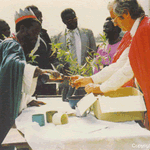African Initiatives

Boston University hosts the second oldest African Studies Center in the United States, and is recognized by the federal government for its excellence in the study of African languages and cultures. The School of Theology is a vital component of African Studies at Boston University, beginning with the sending of graduates to Africa as missionaries over a century ago. Important African alumni include Bishop Josiah Kibira (1964 graduate), the first African head of the Lutheran World Federation; Dr. Kenaleone Ketshabile, Head of the Mission Desk, Methodist Church of Southern Africa; Yusufu Turaki, Professor and former General Secretary of the Evangelical Church of West Africa; and Professor Emmanuel Anyambod, Rector of the Protestant University of Central Africa.

Africa research in the CGCM grows from the work of retired Professor M.L. “Inus” Daneel. His over forty-year presence among African Initiated Churches in Zimbabwe culminated in the 1990s with the largest tree-planting movement in southern Africa, and a program in Theological Education by Extension. The son of missionary parents, Daneel served as a missionary of the Dutch Mission Councils, and then as professor of African theology and missiology at the University of South Africa. He and Professor Robert co-edit the African Initiatives in Christian Mission Series, published by the University of South Africa Press. The goal of the series is to reflect upon contemporary African Christianity, and to document its expansion. Other Africa projects include the digitization of Daneel’s photography and publications on the multimedia site Old & New In Shona Religion, and ongoing research into southern African traditions of earth-care.
See also the Dictionary of African Christian Biography (DACB) listed under Digital Projects.
Dr. Marthinus Daneel, Africa Research Director
In Praise of Greatness: Nimi Wariboko and Africa’s Leading Public Intellectuals
 Nimi Wariboko is featured in a new book on Africa’s leading public intellectuals and living legends. The book, In Praise of Greatness, by the famous historian Professor Toyin Falola of the University of Texas chronicles the life and scholarship of Africans who have made substantive contributions to knowledge. Wariboko is cited as one of Africa's intellectual pioneers.
Nimi Wariboko is featured in a new book on Africa’s leading public intellectuals and living legends. The book, In Praise of Greatness, by the famous historian Professor Toyin Falola of the University of Texas chronicles the life and scholarship of Africans who have made substantive contributions to knowledge. Wariboko is cited as one of Africa's intellectual pioneers.
The back cover explains: In Praise of Greatness, employing poems and prose, pays homage to those African scholars, artists, and public intellectuals who have been exemplary in developing significant ideas and institutional legacies with far-reaching political, social, and cultural impact. Here are remarkable lives of dedicated service that have transformed society, extended the frontiers of knowledge, preserved values, and offered unique perspectives that replace universalism with pluriversalism. In twenty-two chapters that deploy dynamic poetics, distinct cultural tools, and rich traditions, the book presents multiple global-local biographies of preeminent scholars, living legends, and intellectual giants of Africa and its diaspora. Through individual stories, cumulative analyses demonstrate the existence and elaboration of an ontological and epistemic infrastructure that embodies the powerful paradigms that are essential to attaining progress, promoting ethical scholarship, and presenting distinguished Africans to the outside world. The book argues for the maintenance of strong academic traditions and new social thinking beyond patriarchy, as well as more serious attention to poetic and artistic creativity in surviving, navigating, and transforming the varying forces of modernity and globalization with meticulous and sustained attention to local needs and contexts. In Praise of Greatness advances the agenda of nation building by showcasing the formidable works and enduring genius of prominent individuals who have discovered pathways to optimal outcomes for themselves and others through myriad heroic efforts and honorable relationships of generosity and trust. In Praise of Greatness seeks to inspire intellectual productivity in an emergent generation of scholars; to provide a unique lens for interpreting the past and present; and to promote a collective narrative around African development.
Nimi Wariboko is the Walter G. Muelder Professor of Social Ethics at the Boston University School of Theology and a Faculty Associate of the Center for Global Christianity and Mission.
Remembering Lamin Sanneh
 Professor Lamin Sanneh, a dear friend and member of the original DACB Advisory Council passed away suddenly on January 6, 2019. Professor Sanneh's involvement with the DACB began in August 1995, when the DACB was little more than an idea. Since that time, his interest in the enterprise remained constant. His association with the project in its early days lent it the academic credibility essential to its success. He will be sorely missed. We will be publishing his obituary and a full tribute in the near future.
Professor Lamin Sanneh, a dear friend and member of the original DACB Advisory Council passed away suddenly on January 6, 2019. Professor Sanneh's involvement with the DACB began in August 1995, when the DACB was little more than an idea. Since that time, his interest in the enterprise remained constant. His association with the project in its early days lent it the academic credibility essential to its success. He will be sorely missed. We will be publishing his obituary and a full tribute in the near future.
--Jonathan Bonk
Both Jonathan Bonk and Dana Robert spoke about the loss of Lamin Sanneh in Christianity Today. In addition, Dana Robert spoke to the Washington Post as it created an obituary for Professor Sanneh.
Pedagogical Dilemmas in the Global Church
After publishing an article about power and privilege in relation to colonial subsidies and the education of missionary children in the Belgian Congo, Anicka Fast received feedback from people around the world. Their comments spurred her to explain her larger project, and the aims of her research. She also reflects on the complexity of writing history and getting it 'right.' Published in Anabaptist Witness, her reflections on the task and challenge of writing mission history are rich food for thought.
Anabaptists in Nigeria
In 1958 a group of congregations in southeastern Nigeria solicited affiliation with the North American Mennonite Board of Missions (MBM), declared themselves Mennonite, and sought missionaries and assistance. MBM responded by sending missionaries and by providing assistance to Mennonite Church Nigeria (MCN) and others in the region. The collaboration between MCN and MBM developed during a period when partnership was becoming a primary paradigm in the Protestant missionary movement as well as in the Anabaptist tradition.
In his recent article, R. Bruce Yoder ('16) highlights five themes in the missiological discourse about partnership during the last half of the twentieth century and uses those themes to explicate aspects of the engagement between MCN and MBM during the same period. The themes are (1) collaboration, (2) context, (3) reconfiguration of mission structures, (4) bilateral and multilateral approaches, and (5) ambiguity. The first section examines partnership in the Protestant mission movement. The second shows that these themes also arise in Anabaptist mission discourse. The third section presents the case of Mennonite Church Nigeria and Mennonite Board of Missions, showing the partnership paradigm to be a compelling missionary vision while clarifying challenges that may require consideration of additional mission models.
Mission and Transformation in Burundi
 Daewon Moon (PhD '18) and Joenghwa Park spent an afternoon at Boston University, describing their work in holistic mission in Burundi. Together they showcased how churches, schools, and global connections interact to create a healthy and vibrant community.
Daewon Moon (PhD '18) and Joenghwa Park spent an afternoon at Boston University, describing their work in holistic mission in Burundi. Together they showcased how churches, schools, and global connections interact to create a healthy and vibrant community.